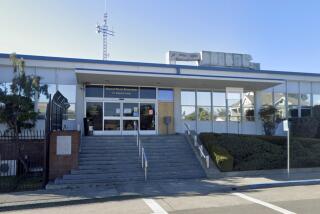Sour Note Sounds as Panel’s Birthday Looms
The Berkeley Police Review Commission, one of the oldest citizen review boards in the country, is preparing to celebrate its 30th anniversary.
And to mark the occasion, the city plans to throw a party Thursday, complete with live music and a keynote speech by political activist Dolores Huerta, a co-founder of the United Farm Workers and member of the University of California Board of Regents.
But the hoopla over the anniversary has rekindled old criticism of the commission by the Berkeley Police Assn., the union representing the city’s 204 officers.
The union contends that the panel is biased: It banned police dogs, outlawed the chokehold and routinely finds officers guilty of misconduct ranging from discourtesy to excessive use of force.
“There are people on the commission who are anti-cop, no matter what the situation,” said Sgt. Randolph Files, the union’s president. “You can help an old woman across the street and you have somehow offended her by sticking your arm out to offer her support.”
But despite its findings, the commission can only make recommendations for disciplinary action.
“The biggest impact the commission has is that it allows the victim a forum to confront the officer in a hearing setting. That gives both citizens and police officers a sense that there is some accountability,” said John Burris, an Oakland-based civil rights attorney. “It also gives the citizen another choice besides expensive litigation and simmering resentment.”
Commissioner William White defended the panel’s rulings. Citing statistics from the annual report, he said the board typically upholds only a third of the allegations made against police officers. Public hearings are held on roughly half of the 50 or so citizen complaints the commission receives each year.
“We make our judgments based on the facts before us and the credibility of the officers, complainants and witnesses who testify at hearings,” he said. “To say we do anything else is farcical.”
Civil rights attorney James Chanin, one of the city’s first commissioners and an early organizer of the 1973 campaign for civilian review, said police suppression of antiwar protesters and the mistreatment of African Americans convinced Berkeley voters to support the establishment of a commission.
He said the single most important event was the 1969 People’s Park demonstration, in which a crackdown by police and Alameda County sheriff’s deputies on a student protest left one man dead and dozens injured.
“After that, Berkeley voters would have approved just about any police oversight measure that was before them,” Chanin said.
More to Read
Sign up for Essential California
The most important California stories and recommendations in your inbox every morning.
You may occasionally receive promotional content from the Los Angeles Times.









